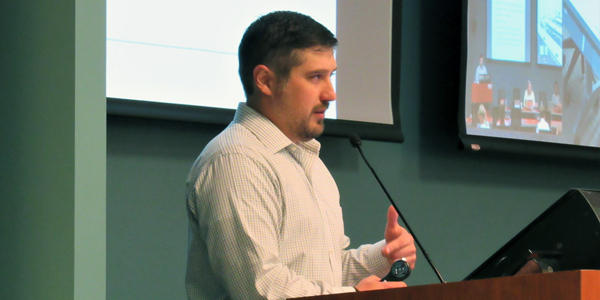MISO is planning to file with FERC in October a proposal to create two new benefit metrics to appraise new market efficiency transmission projects.
Following on its promise to create more specific benefit metrics, the RTO will propose to consider the cost of avoided reliability projects and reduced settlement payments on SPP’s transmission between MISO Midwest and South. (See “New Benefit Metrics,” MISO Planning Subcommittee Briefs: June 12, 2018.)
“We’re looking for physical reductions at this point,” MISO Director of Strategy Jesse Moser said during an Aug. 14 Planning Subcommittee meeting. He said MISO is initially seeking a “straightforward” approach to determining whether a project will reduce annual payments to SPP for flows above the contract path capacity between Midwest and South. MISO may be open to more in-depth analyses on contract path reductions in the future, he added.
Moser said transmission owners and state regulators must be able to work together to allow MISO to use avoided reliability projects to gauge the monetary value of an MEP.
“You’re really asking a transmission owner to take a project off their books,” which requires regulator approval, Moser said.
Moser said if a TO is unwilling to drop a project, MISO members could always pursue the RTO’s alternative dispute resolution process.
“We don’t expect that to occur, frankly,” he added.
Inverter Connections Testing?
MISO is debating which route it should take to ensure that inverter-based generation interconnecting to weaker sections of its grid doesn’t disrupt operations.
After reviewing stakeholder suggestions, MISO said it could require inverter-based generators to conduct their own Electromagnetic Transients Program (EMTP)-type study and perform to a standard. It could also revise its own generator interconnection agreement to disallow “momentary cessation” of active power output from inverter-based resources in order to prevent them from tripping offline unnecessarily.
Generator interconnection engineer Warren Hess said MISO is seeking the best approach to prove the system won’t suffer degraded reliability from inverter-based generation interconnections.
“We do want you to demonstrate that your machine can operate with no adverse impacts,” Hess said.
In feedback, multiple stakeholders said MISO should require a test for inverter-based generation, with some saying each interconnection customer be required to provide under- and over-voltage trip settings as part of their definitive planning phase application process of the queue.
But some stakeholders said requiring an EMTP study by default could become a burden, claiming that some inverter-based generation will connect to a strong point on the system and won’t require testing.
“These studies can be time-consuming and costly … it’s not just a simple thing,” said Wind on the Wires’ Rhonda Peters.
Others pointed out that allowing too many inverter-based generators on the system aggravates reliability issues.
MISO Frequency Performance up to Snuff
Final results from MISO’s NERC-required under-frequency load shedding study show that generators are performing to standard.
The RTO studied seven under-frequency load-shedding islands in MISO Midwest and initially found that the frequency performance in four exceeded the NERC requirement. (See “Generators Miss 1st Pass in Under-frequency Study,” MISO Planning Subcommittee Briefs: June 12, 2018.)
All seven islands now meet both a frequency and volts-per-hertz performance threshold, said Anton Salib of the RTO’s expansion planning group. MISO tested the islands by simulating a disturbance to cause imbalance between generation and load, Salib said.
As a result, MISO said no changes are needed to its current treatment of the islands.
MISO will conduct its next under-frequency load shedding study in 2020, when MISO South is due for five-year testing.
— Amanda Durish Cook





